
Emma Hearne talks the role of lawyers when power over people’s lives is held by a few

Injustice always had an impact on Emma Hearne, and it was a passion she brought into her career as a lawyer. She nurses a desire to help clients combat governments and institutions, because “we need to speak truth to power whenever and wherever we can”.
Hearne was appointed to co-lead the National Justice Project’s legal team alongside Ashleigh Buckett earlier this year, and Hearne is eager to innovate further and strengthen protections for First Nations people.
In this interview, Hearne talks about dabbling in software and tech, and how having a degree in psychology adds to her legal work.
I’ve always seen and been drawn to the injustices in the world. It sounds clichéd, but I wanted to have a career in law to help others. My favourite part of the job is assisting our clients in their fights against governments and institutions. There is so much power over our lives, held by a few, that we need to speak truth to power whenever and wherever we can.
As someone who’s going to help lead the National Justice Project’s legal team, what new programs and initiatives are you particularly interested in championing?
Working in a small not-for-profit lends itself to performing tasks outside of the usual scope of being a lawyer! I’ve been involved in our software and tech space for years, and I’m looking forward to being able to progress this further in the space of innovation, workflows and automation of work to increase efficiencies and reduce the load on our team.
From my background in criminal law and particularly work at the Aboriginal Legal Service, I think the most pressing issue is what it has always been since colonisation – the over policing and targeting of First Nations people. This is because of the disproportionate flow on effect it has to the erosion of other human rights at every stage of the ‘justice’ system; such as assault by police, deaths at the hands of police, higher charge rates from lack of de-escalation tactics, higher incarceration rates of First Nations people, mistreatment in custody, including health care, and deaths in custody.
In the past year I have finally seen through a few refugee justice cases that I have been working on for six years, beginning when the clients were on Nauru, working to go to court to obtain, quite literally, life-saving treatment, to many long years of legal battles, and now closure for some clients. It is only the beginning of the number of clients we have cases for around this issue, but we are persevering, and sometimes as lawyers we need to embrace that stubbornness to keep fighting!
The importance of pro bono work is certainly understood by many in the profession, and we are fortunate enough to receive pro bono assistance in legal work and in kind from many partner firms. It would be great to see more in the profession appreciate the importance of pro bono work as a genuine desire to help others beyond meeting a set target of hours.
As many have kbeen thinking about it recent years, the exponential pace of development and concerns around the control of AI and it uses, are certainly going to be challenge for the business of law, and how it effects (both usefully and detrimentally) the work of lawyers, as well as our positions in what were previously thought as standard and secure roles within law firms.
I was lucky enough to have a long break last year with an overseas trip. This year I’m looking forward to recharging and self-care with shorter staycations and regular time with family.
I’d like to be in psychology or (at a stretch!) marine or wildlife biology. My other degree was psychology and its incredibly useful in the work that we do, having care and compassion for clients, and trying to understand their experiences.